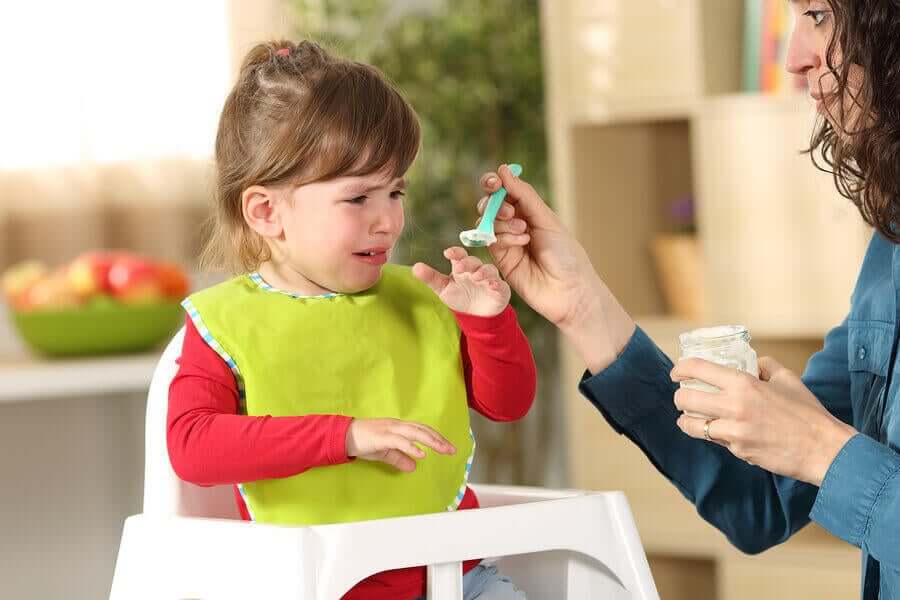When Should I Start to Worry If My Baby Doesn’t Want to Eat?
When should I start to worry if my baby doesn't want to eat? Pediatric consultations are full of parents tormented by this issue. When in doubt, you need to observe and employ common sense.

From the moment a baby arrives in the world, their parents often have many questions regarding their diet. These include whether they’re eating too much, too little, too frequently, or not frequently enough. However, it’s difficult to know exactly when you should start to worry if your baby doesn’t want to eat.
The most important thing at first is to observe your baby carefully. In this way, you should be able to discern whether it’s a problem that requires specialized attention. To do this, you should bear in mind the following points.
My baby doesn’t want to eat!
If your baby has a cold, fever, or even if they’ve just had a vaccine, then their appetite is likely to decrease. If after three or four days the situation doesn’t improve, then make an appointment to see your pediatrician.
Check to see if their stomach is hurting, or if it feels hard. In this case, they may have constipation. On the other hand, more obvious signs are diarrhea or vomiting. In such cases, it’s likely to be a digestive problem, and this will require medical attention.
If your baby hasn’t eaten well since he was born, then your pediatrician should check to see if he has reflux or even lactose intolerance. Both can be uncomfortable to a greater or lesser degree in babies and need to be taken care of.
Finally, consider your expectations. Your child may be eating less than you think he should, quite simply because he’s full and doesn’t need any more. There are often good valid reasons why your baby doesn’t want to eat.

A baby’s physiology
If you aren’t sure how much food is enough, and when you should start to be concerned, then keep in mind that the amount of food a baby eats is in relation to his size.
To give you an idea: at 10 days old, a baby’s stomach is the size of a chicken’s egg. During the first year, a newborn grows 8 inches and puts on around 15 lb. Afterwards, his growth slows down, and also his appetite.
Many children start eating more between the ages of five and seven, when their body size starts to increase more noticeably. However, you should keep in mind that the amount of food that each child needs varies greatly, and so you should avoid comparisons.
What’s the function of food?
On this issue, pediatrician Carlos González sheds light on the subject in his book My Child Isn’t Eating. He explains that the function of food is to keep us alive, help us grow, and provide enough energy to move.
It’s a good idea for us to take into account our baby’s body and life. On the one hand, the amount of food we need is in relation to our size, and children, even though they’re growing, need much less food than an adult, due to their size.
On the other hand, the energy they expend isn’t as much as we would think, especially in babies, who spend much of their time in bed or in our arms. Even when they start walking, the energy they use up is minimal. You should keep all this in mind before getting alarmed unnecessarily.

Healthy habits at mealtimes
Here are some healthy habits for you to bear in mind if your baby doesn’t want to eat, and as general guidelines for children.
- Never force your children to eat. It’s counterproductive to force them to eat, as they’ll end up having a negative association with food. Trust them when they say or show that they don’t want any more to eat, and just feed them small amounts at a time.
- On a similar note to the previous point, create a pleasant atmosphere around the table, and never punish or blackmail them when eating.
- Be patient when trying to give them new food. Introduce them one at a time and try several times until they get used to their taste or texture. If they don’t like something, then respect their feelings. Adults don’t like all types of food either.
- Always give them healthy options when eating. When they start eating solids, then offer them fruit or nuts. Try to avoid sugars and refined or processed foods.
- Combine foods that they already know and accept, along with the new ones.
Be an example
- Be a good example. They can acquire healthy eating habits if they start at an early age. It’s important that they see you eat healthy foods too.
- Whenever your baby starts to eat, offer them several different types of food, and let them eat what appeals to them.
- When they’re older, you can encourage their autonomy by letting them participate in kitchen tasks such as setting the table, serving the food, and deciding on the amounts they want to eat.
- Establish routines – children need to know what’s happening next during the day. Decide on specific times and places to eat together.
